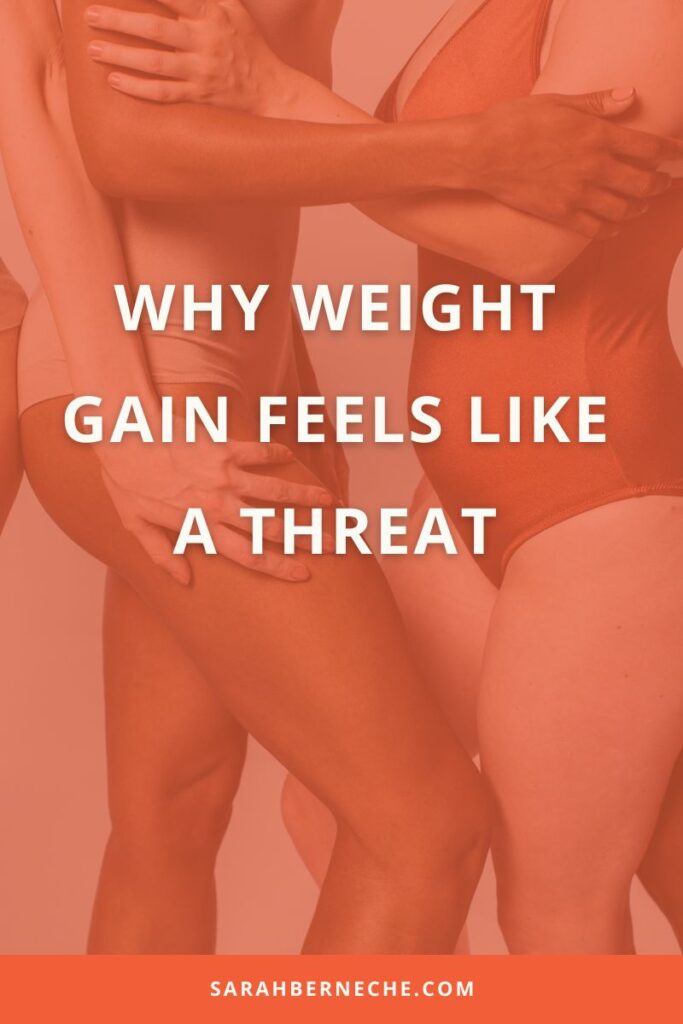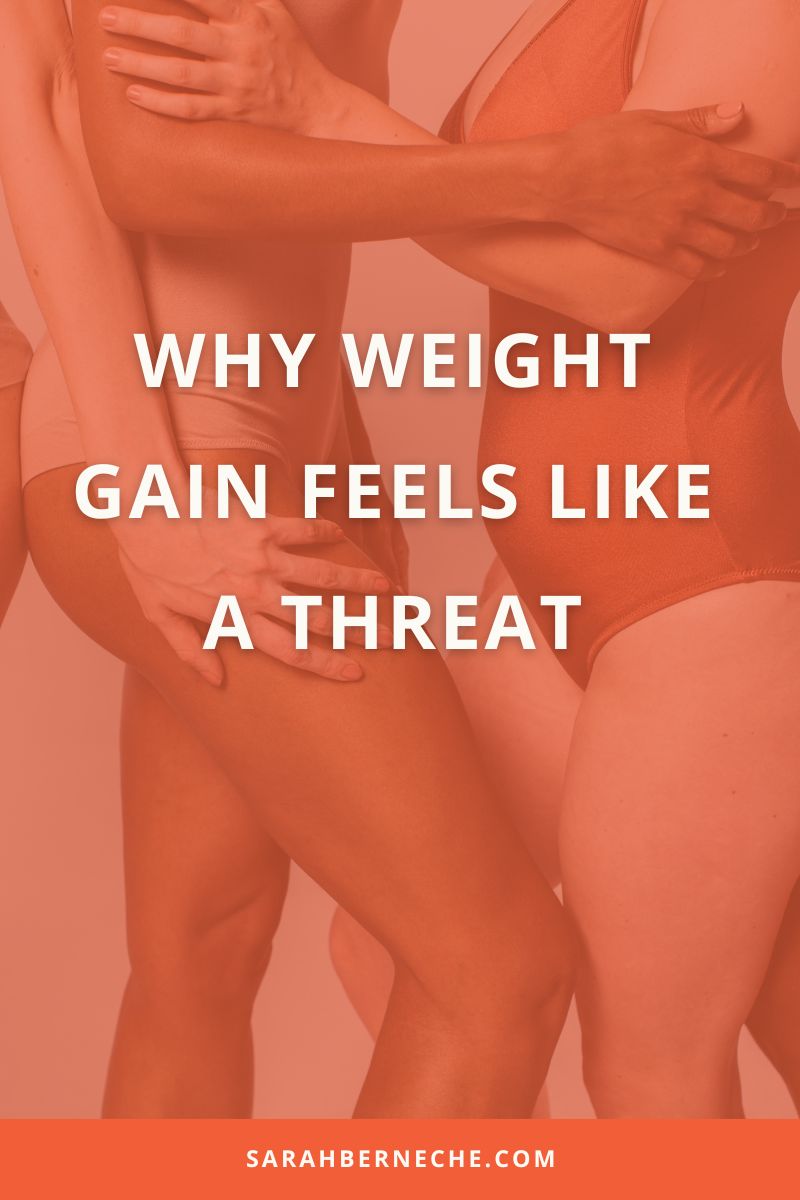It’s easy for people to fall in love with Intuitive Eating conceptually. I eat what I want, when I feel like, with some degree of body awareness? Cool cool.
After years of painstakingly counting macros, points, or calories, even the mere thought of allowing yourself to eat “cheat” meals without a Cinderella-esque deadline is enough to have anyone feel like they’re walking on a cloud.
…Except for the part where you accept your body the way it is and stop trying to change it.
Even when you’ve had it up to your eyeballs with exhausting meal prep routines, you might still feel ambivalent or fearful about body acceptance work. In studies evaluating participants’ motivations for weight loss, appearance-related reasons often come second to health concerns. Because our society is so weight-centric and weight bias impacts so many elements of the human experience, it makes sense that you may go to great lengths in an attempt to escape it.
And why the uncertainty of what could happen to your body is preventing you from taking action on your recovery goals.

Despite systemic and interpersonal challenges, I do think it’s possible to change the relationship you have with your body, improve your experience in your current body, and think about the way you look a whole lot less. But first, let’s look at why you feel threatened by weight gain or a changing body…and what you can do to lessen this enough to move forward with Intuitive Eating or a healthier relationship with food.
1. Weight gain and fatness carry negative associations.
First things first: let’s address your beliefs about weight gain and fatness. Because of diet culture, weight loss and thinness are often coded for good health and hygiene, beauty and attractiveness, success, willpower and discipline, productivity, and more. In contrast, weight gain and fatness are typically associated with the opposite.
I invite you to examine your beliefs and biases about weight. What do you believe about fat? Where did your beliefs about weight originate? What would you like to think about weight and (for instance) your dating prospects? Who would you be, and how would your life change with these new beliefs?
The beliefs you possess about weight are likely not facts, but projections. That doesn’t mean they’re arbitrary. But it does mean they’re changeable. Like many I’ve worked with, you might find that the desire for weight loss is preventing you from taking action on the things you want. How many vacations have you put on hold or trips to the shopping mall delayed in hopes of “one day” being finally worthy to experience them? On her Instagram, Body Image Coach Bri Campos recalls life when she was smaller, stronger, and more mobile and wonders how the trip may have been different. But she realizes she may not have travelled to Costa Rica at all, even at that stage, because she was still pursuing the “ideal body.”
Provided you have the resources to do so, you can pursue health habits and behaviours now, such as eating enough food, drinking water or other fluids throughout the day, or stretching your body. You can start dating now by participating in speed dating events, making a profile on a dating app, or asking friends to set you up with someone they know. You can pursue your dream job now by attending networking events and conferences, submitting applications, or expanding your skill set through courses and workshops.
As I often say, there are limits to what size can perform. Weight loss is not a genie in a bottle or a magical panacea for all that ails you. It can’t guarantee a loving relationship, a great social network, a rewarding career, a pain-free body, or a long and healthy life. Does thin privilege exist? Absolutely. Life is easier for thin people, and specific experiences may be easier in a smaller body. But consider whether you’re attributing more power to weight loss or thinness than it merits…and what might be possible in your today body.
2. Weight is seen as something within your control.
Even though studies performed on twins separated at birth (here, here) show that weight is approximately 70% genetically determined, the diet industry has been incredibly successful at convincing us otherwise. You could have the body you wanted if you just worked hard enough, right? Truth talk: if you subscribe to set-point theory, there’s a weight range your body wants to be at and will fight to defend. Most people find there’s a weight they can’t go under, but the opposite is also true. Contrary to diet culture, we don’t just gain weight indefinitely (and weight regulation is much more complicated than a simple mathematical equation!)
Just look to ‘Atypical’ Anorexia. If weight loss were all about diet and exercise, those who over-exercise and under-ate would become thin or continue to lose weight, right? Except 94% of people with a diagnosed eating disorder are not clinically underweight, and many will exhibit symptoms of severe malnourishment before they ever get to the “normal” weight BMI category (P.S. this isn’t a dare.)
Certain privileges, such as access to fresh foods, blood sugar-regulating foods, and time to exercise, may affect your weight. But overall, your weight range is primarily out of your control, despite so many claims to the contrary. When weight gain is positioned as within your control and therefore a moral failing when you don’t measure up, it makes sense to fear it. Nobody wants to be criticized or rejected. But gaining weight doesn’t mean something is wrong with you, your exercise, or your eating. Weight gain is often a sign of good health and self-care!
Consider: What has my experience with dieting taught me about sustainable weight loss? What lengths have I had to go to to lose weight? How did I feel when I was dieting?
3. It’s hard to feel comfortable in a body you don’t want to feel — and trauma survivors in particular do not want to feel their body at all.
Many trauma survivors don’t want to have a body or be in their body. Maybe you not-so-secretly wish for a prepubescent body or to be a talking head? Because the body is fundamentally a container for emotions, sensations, memories, images, and more, it can sometimes feel like a Stranger Things cave you don’t want to enter under any circumstances.
Trauma survivors often want to stay as far away from the body as possible to limit contact with somatic remnants of painful, dangerous, and terrifying experiences. Eating and any ensuing weight gain can feel threatening because they bring us deeper into our bodies, whether we want to be there… or not.
It is possible to shift this way of being and start feeling your body again. But this isn’t something you can think your way out of or diet your way toward. And it doesn’t necessarily begin with advanced strategies like meditation or “what do you feel in your body?” questions. In the work I do with clients, we slowly build up to tolerate feeling more and more of the body through specific Somatic Experiencing® strategies such as titration, pendulation, and resourcing.
4. When you’re not connected to your body, your body size can become a proxy for the cues you’re unable to access.
When you’re disconnected from your body, it’s challenging to attune to internal cues of danger, threat, and safety. In cases like these, the body can become a proxy: if I’m in the “right” body, I’m safe. If I’m in the “wrong” body, I’m unsafe. Have you noticed this in yourself? Many people have a specific size they don’t feel comfortable going over or a weight they’re fearful of reaching. At the same time, there are several reasons for this (e.g. associations, beliefs), and part of it may be attributed to corporeal disconnection.
You don’t necessarily have to have an explicit trauma history, either. Chronic dieting patterns or getting by with less food than you need can also lead to more disconnection from your body’s cues.
Even though the “perfect body” doesn’t guarantee a threat-free existence, it may feel like the only means you may have of creating some semblance of safety for yourself.
If you don’t try to control your body size, you might feel as though your life is out of control — and that something bad could happen to you again. It’s understandable, then, that weight gain feels like a threat to your existence if you lack any other way of knowing you are okay outside of a number on the scale or a pant size.
It’s very possible to restore access to these cues and start picking up on and differentiating between safety, danger, and threat. But it’s not going to come by doubling down on dieting or working harder at your weight loss goals, which will take you further away from your body.
5. A lack of healthy boundaries.
If you’ve experienced trauma, you may struggle with having flexible, supportive boundaries. Maybe past experiences of saying “no” were disrespected or dishonoured.
I often say in my practice that a genuine, authentic ‘yes’ hinges on a safe ‘no.’ This is incredibly important when it comes to repairing your relationship with food and your body. If you don’t know how to say “no” or saying “no” feels unavailable, you may not trust that you will ever stop eating once you start. You may not know what you like from what you don’t, what you want to eat versus what you don’t want to eat. You may not have a clear sense of when you want something to eat for physical reasons, emotional reasons/desire, or if you do not want it at all. Even if you intellectually know you will stop eating at some point and will not gain weight forever, you may not trust that if you do not have the lived experience of healthy boundaries. It is actually possible to stop eating without controlling the experience. It is actually possible for your weight to regulate without controlling the experience. It is actually possible to enjoy eating without losing control.
What is your most significant takeaway from today’s post? And is there anything you’d like to add?
Want out of the diet cycle for good? Here’s how we can work together:
- Work with me 1:1. Together we’ll review your current relationship with food and your body, discuss your goals for our time together, and help you to feel safe with food and your body without #dietmath.
- New to Intuitive Eating and a non-diet approach? My book, Enjoy It All: Improve Your Health and Happiness with Intuitive Eating, offers a guide to finding lasting peace with food.

Comments +